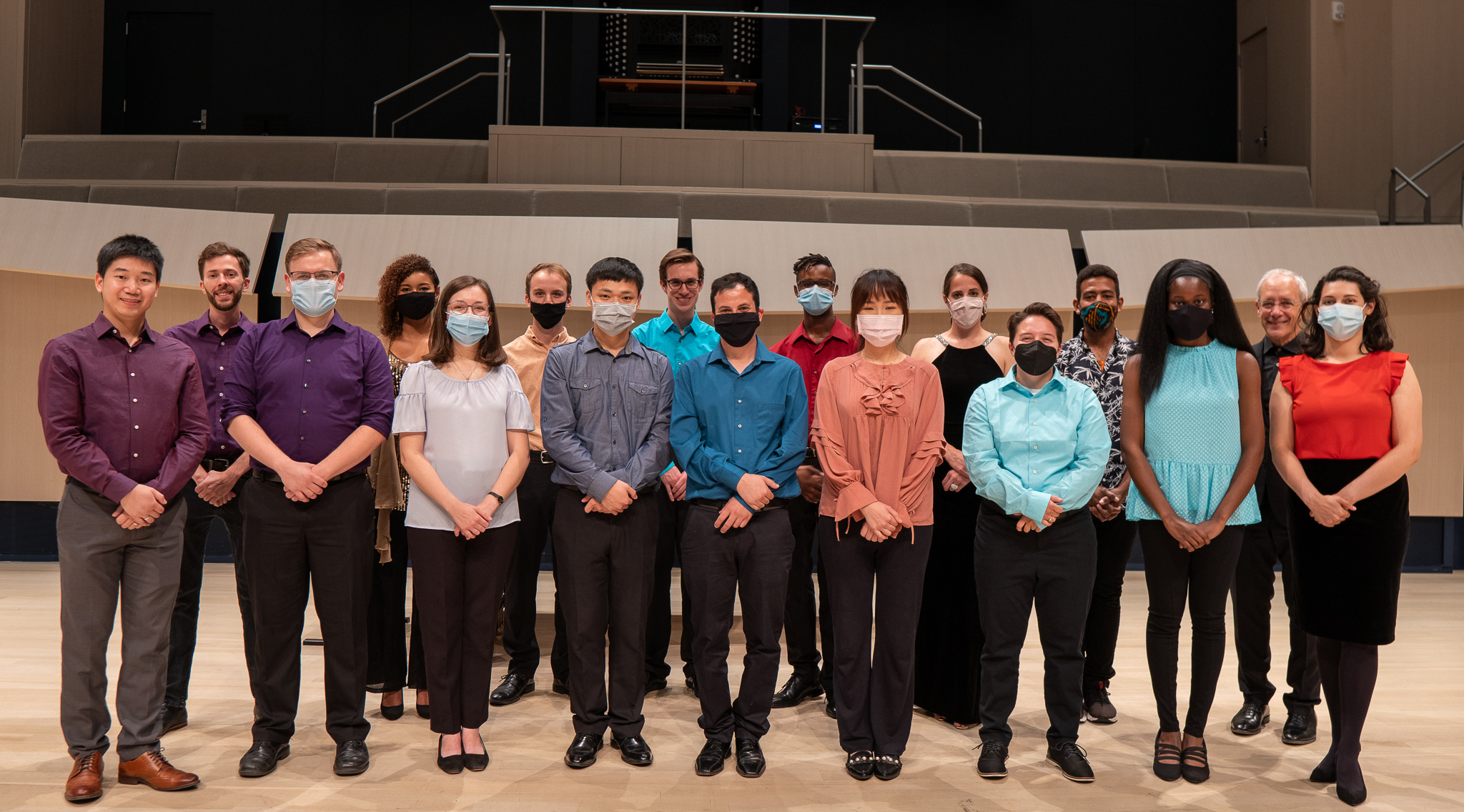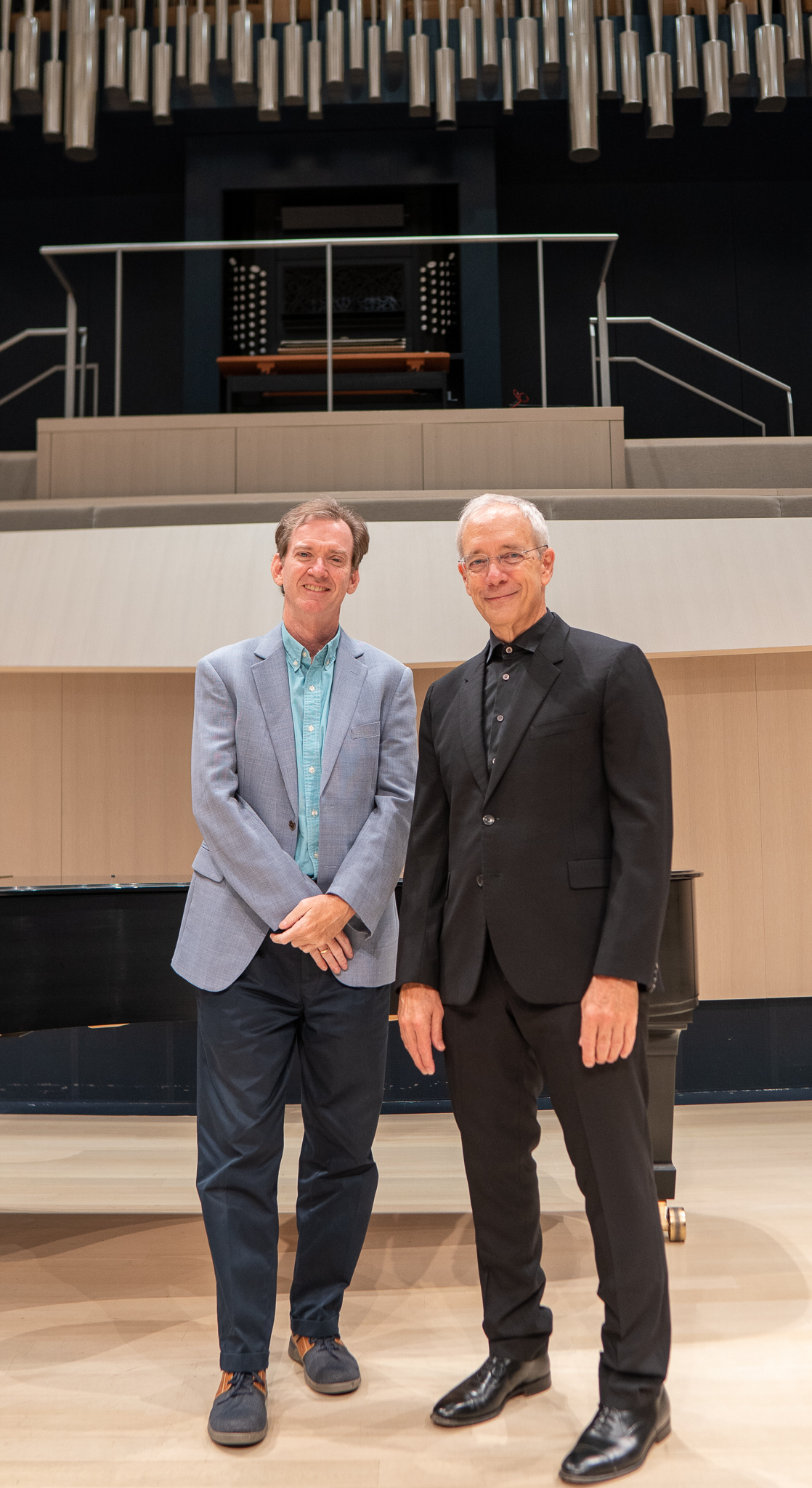CNM Ensemble Concert I
Sunday, September 26, 2021 at 7:30p in the Concert Hall
Program
Forever (2015, rev. 2021), for solo violin |
Irina DUBKOVA |
| Junhong Zhou, violin |
drip/spin (2017, rev. 2019), for flute and piano |
Katherine BALCH |
| Tâmila Freitas, flute Neil Krzeski, piano |
Quintet for Bassoon and Strings |
Carson COOMAN |
| Keegan Hockett, bassoon Junhong Zhou, violin I Ramel Price, violin II Fatima Gassama, viola Adrian Gomez Hernandez, violoncello |
| intermission |
Arbores Erimus, for violin and electronics |
Finola MERIVALE |
| Josh Henderson, violin |
L'Extase Langoureuse, for soprano and chamber ensemble (2017) premiere |
James CROWLEY |
| Kelly Hill, soprano Tâmila Freitas, flute Lisa Lutgen, oboe Ana Maria Locke, clarinet Keegan Hockett, bassoon Irene Tang, horn Meaghan Reinschmidt, trumpet Jordan McFarland, percussion Junhong Zhou, violin I ShengHo Wang, violin II Fatima Gassama, viola Adrian Gomez Hernandez, violoncello Alexander Waters, double bass David Gompper, conductor |
Performer Biographies
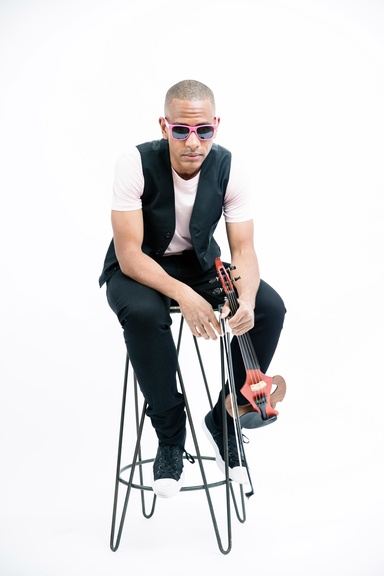
NYC based Violinist, Violist, Electric Bassist and Composer Josh Henderson leads a multi-faceted career that ranges from solo performances with orchestras to playing electric violin in Rock Bands. A player in the groups Contemporaneous and Warp Trio among others, he regularly performs all over the globe and loves playing music of all styles.Carving out a reputation in Jazz, Rock, Hip-Hop, and Country-Fiddle for his dynamic performances, he has served as music director for the Emmy award-winning Damien Escobar (of Nuttin' But Stringz), and in this role has performed at a number of events across the globe including a performance at the 2013 Hip-Hop Inaugural Ball hosted by Russell Simmons and honoring Barack Obama.As a composer, he has written for films and had several chamber works performed, including a Carnegie Hall premier of his "A Bird Fell Today" by Duo Anova. Larger works include a full length Ballet for Caliince Dance company, "Marie: Embroidering Survival", which was premiered at Alvin Ailey Dance Theater in 2012, the 2014 the premier of his viola concerto by the Chelsea Symphony, and the 2017 premiere of his co-written Triple Concerto for Warp Trio and Urban Playground Chamber Orchestra.He can be found online at www.joshhendersonmusic.com. |
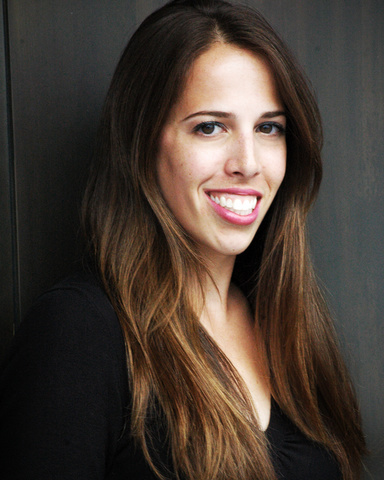
Kelly Hill, Mezzo-soprano, began her doctoral studies at the University of Iowa in 2018 as the Iowa Performance Fellow. As a student of Professor Stephen Swanson, she has soloed with the University of Iowa Orchestra, under the direction of Timothy Stalter, in Joseph Haydn’s Missa in tempore belli and Karl Jenkin’s The Armed Man: A Mass for Peace. She has portrayed the title character in Peter Brook’s adaptation of Bizet’s Carmen, and also performed the role of Jo March in the University Opera Theatre’s production of Mark Adamo’s Little Women.Locally, she returned to the Cedar Rapids Opera Theatre as Suzuki in Madama Butterfly, and made her hometown operatic debut as Marcellina in Mozart's Marriage of Figaro with the Opera Quad Cities. Other local concert work includes appearances with the Chamber Singers of Iowa City, Cornell College, and an upcoming collaboration with the Quad Cities Symphony Orchestra with the world premiere of Jacob Bancks’ opera Karkinos.Kelly holds degrees from the Yale School of Music and the University of Northern Iowa, and has apprenticed with the Cedar Rapids Opera Theater, Central City Opera, and Santa Fe Opera. She is a two-time Regional Finalist in the Metropolitan Opera National Council Auditions, and a former fellow of the Aspen Music Festival and School.
|
Program Notes and Composer Biographies
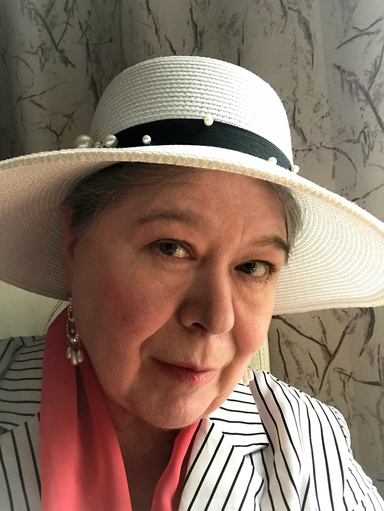
Forever (2015). In the soul of every person there exist the most important things that remain, even when one departs this world. They stay forever, and they make the world brighter, more joyful and happier. Simple but eternal things. Irina Dubkova began composing at the age of five. After completing her college training as a pianist, she graduated from the Moscow Conservatory in composition and completed post-graduate studies with Roman Ledeniov in composition and Yuri Kholopov in theory. Irina Dubkova has participated in many competitions and festivals. Her compositions have been performed regularly at the annual festivals, such as the International Organ Gedike's Festival, Leonid Roizman Organ Festival, International Moscow Autumn, Universe of Sound, Nippon Kokoro, Earino Spring Festival, All Russia Harp Festival and Meeting of the Friends, Winterreise, among others. Performances of Dubkova's symphonic, chamber, vocal and choral music have been heard across the Russia and in many regions of the world, including Austria, Germany, Finland, Greece, Switzerland, USA etc. |
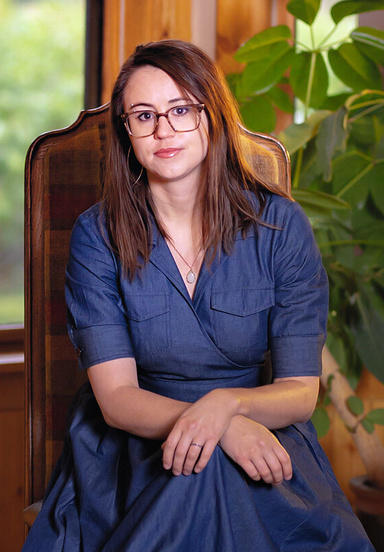
In drip / spin (2017, rev. 2019), these two verbs are represented and enacted musically by the flute and piano. Both drip and spin conjure evocative images for me: while dripping connotes a solemn, delicate, not-quite-steady sound and feeling, spinning connotes playfulness, dizziness, and repetitive cycles. Dripping also suggests an action that is irreversible, while spinning might involve a return to where the cycle began. The flute and piano play with and ponder the myriad of gestures these words suggest. The music of composer Katherine Balch (b. 1991) captures the magic of everyday sounds, inviting audiences into a sonic world characterized by imagination, discovery, and a rich diversity of styles. Katherine is often inspired by literature, nature, and science, aptly reflected in the San Francisco Chronicle’s description as “some kind of musical Thomas Edison – you can just hear her tinkering around in her workshop, putting together new sounds and textural ideas.” Katherine’s facility in elevating ordinary sounds through large-scale orchestration and dramatic narrative arcs has led to commissions and performances with the Los Angeles Philharmonic, London Sinfonietta, Orchestra Philharmonique de Radio France, Ensemble Intercontemporain, and the symphony orchestras of Boston, Minnesota, Oregon, Albany, Indianapolis, and Tokyo. She has been featured on IRCAM’s ManiFeste, Fontainebleau Music Festival, and Festival MANCA in France, Suntory Summer Arts and Takefu Music Festival in Japan, and the Aspen, Norfolk, Santa Fe, and Tanglewood music festivals in the United States. Nominated by violinist Hilary Hahn, Katherine was just announced as the recipient of the Dallas Symphony Orchestra’s 2020 Career Advancement Award. She has also been honored by ASCAP, BMI, the American Academy of Arts and Letters, Chamber Music America, and Barlow Foundation, and has served as composer-in-residence for Young Concert Artists and the California Symphony. In 2021, she will be in residence at the American Academy in Rome as the Elliot Carter Rome Prize Fellow. Deeply committed to developing inclusive, engaging pedagogical practices that empower students through creative music-making, Katherine currently teaches composition and orchestration at Mannes School of Music. She a doctoral candidate at Columbia University and an alumna of the Yale School of Music. Her chamber works are published by Schott PSNY. Katherine documents her lived experiences on the page, with each composition serving as a diary of what has captivated her curiosity. When she’s not creating, she’s collecting inspiration from the nearest botanical gardens, Rimbaud’s poetry, or her feline sidekick, Zarathustra. |
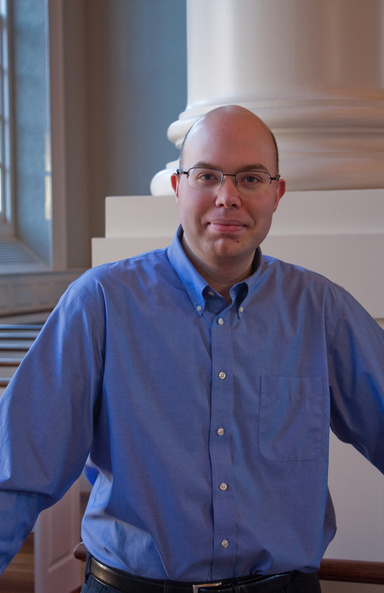
Quintet for Bassoon and Strings (2005–08) was commissioned by The Commission Project and is dedicated to Klaus Heymann, in tribute for his invigoration of the classical recording industry and his enthusiastic support for the composers of our time. Carson Cooman (b. 1982) is an American composer with a catalog of hundreds of works in many forms—from solo instrumental pieces to operas, and from orchestral works to hymn tunes. His music has been performed on all six inhabited continents in venues that range from the stage of Carnegie Hall to the basket of a hot air balloon. Cooman’s music appears on over forty recordings, including more than twenty-five complete CDs on the Naxos, Albany, Artek, Gothic, Divine Art, Métier, Diversions, Convivium, Altarus, MSR Classics, Raven, and Zimbel labels. |
|
Arbores Erimus was composed in 2013 for violinist Todd Reynolds. It is a sister piece to my 2011 work Arbores Erimus … aut Cementum for cello and electronics. Both pieces reflect on mortality and are inspired by my sister’s artwork – an abstract ink drawing of a tree, with a subtle outline of a human face forming the tree trunk. There is a mirror image of this face, upside down, on the opposite side. This painting instantly reminded me of a Thomas Hardy quote from his poem Drummer Hodge:“his northern breast and brain grow to some southern tree”. I thought this was a beautiful and peaceful image of the cycle of life: death becomes part of new life. Arbores Erimus is an open score; the performer has the freedom to improvise over the notated material, and form their own reflections of the drawing, which is printed alongside the score. Finola Merivale is a composer from Ireland living in New York. She is a doctoral candidate at Columbia University, where she is studying with George Lewis, Georg Friedrich Haas and Zosha Di Castri. Her music has been featured at festivals such as Huddersfield, Bang on a Can, and the Contemporary Music Festival of Buenos Aires. Her works have been played by International Contemporary Ensemble, Talea Ensemble, Crash Ensemble, and musicians of the Chicago and St. Louis Symphony Orchestras, amongst others. |
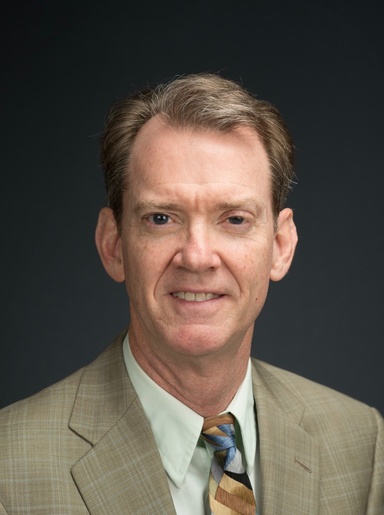
L’Extase Langoureuse is a setting of Paul Verlaine’s poem C’est Lextase – a poem also set to music by Fauré and Debussy (with piano). My inspiration came not necessarily from their famous settings, but rather from a desire to investigate French diction and French notions of scale, melody, harmony and timbre. While the listener may perceive some word-painting in the music, the primary goal was to weave seamless textural threads throughout the piece, using persistent metric modulations to unexpectedly shift the tempo and perceived speed of the musical flow. While not a lengthy work, it is a piece intended to take the listener on a diverse, concentrated and colorful acoustical journey. James Crowley is an American composer whose works have been performed throughout the USA, as well as in Argentina, Belgium, Canada, France, Germany, Denmark, South Africa, South Korea, and India. His 2010 work 'Tableaux Vivants' was commissioned by the east coast ‘Duo Montagnard’, who toured the piece throughout the USA, Canada, and Europe, and feature it on their most recent CD release entitled 'Messengers'. Crowley's 2008 composition 'From The Earth' was a prize winner in the Ravinia Music Festival’s first composition competition and was toured on an east coast tour and throughout Illinois in 2009. Most recently, the guitar/bass duo 'Dez Cordas' commissioned and recorded a new work entitled 'Pilgrimage', which was released on the Summit CD label in spring 2015. Other commissions and awards have been received from the Music Teachers National Association, National String Teachers Association, American Music Center, and Meet-The-Composer. His music has been performed by the Minnesota Orchestra, the Eastman Wind Symphony, Civic Orchestra of Chicago, the Aspen Contemporary Ensemble, and by members of the Chicago Symphony Orchestra, Cleveland Orchestra, Montreal Symphony, and Milwaukee Symphony Orchestra. |
| C’est l’extase langoureuse, C’est la fatigue amoureuse, C’est tous les frissons des bois Parmi l’étreinte des brises, C’est, vers les ramures grises, Le chœur des petites voix. Ô le frêle et frais murmure! Cela gazouille et susurre, Cela ressemble au cri doux Que l’herbe agitée expire … Tu dirais, sous l’eau qui vire, Le roulis sourd des cailloux. Cette âme qui se lamente En cette plainte dormante C’est la nôtre, n’est-ce pas? La mienne, dis, et la tienne, Dont s’exhale l’humble antienne Par ce tiède soir, tout bas? -Paul Verlaine (1844-1896) |
It is languorous rapture, It is amorous fatigue, It is all the tremors of the forest In the breezes’ embrace, It is, around the grey branches, The choir of tiny voices. O the delicate, fresh murmuring! The warbling and whispering, It is like the soft cry The ruffled grass gives out … You might take it for the muffled sound Of pebbles in the swirling stream. This soul which grieves In this subdued lament, It is ours, is it not? Mine, and yours too, Breathing out our humble hymn On this warm evening, soft and low? |
